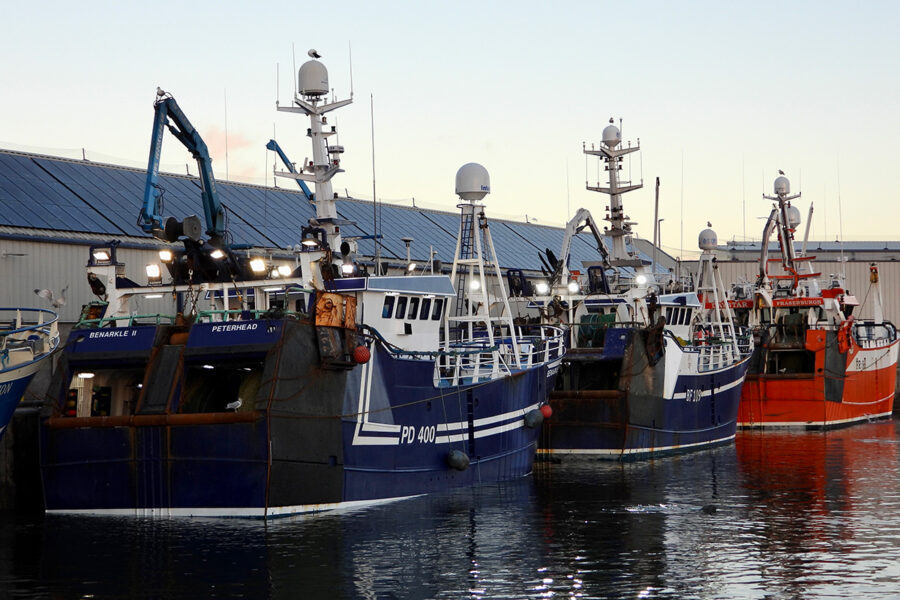Scottish industry leaders have reported a challenging start to the year for some parts of the catching and processing sectors, with fishing hit by bad weather in January and February and demand and prices affected by the high cost of living.
SFF chief executive Elspeth Macdonald told a meeting of the North East Scotland Fisheries Development Partnership (NESFDP), which she co-chairs with Andrew Brown of Macduff Shellfish, that whitefish prices were ‘a bit depressed’ after Christmas and people were keen to see an increase in demand in the run-up to Easter.
A ‘perennial’ problem was the large amounts of small haddock being caught, which was ‘pretty challenging’ for processors, she said. Some of the whitefish fleet are starting to move to Rockall as usual at this time of year in search of haddock.
Prawn fishing has been poor, with the animals staying in their burrows, but there are reports that it is now improving.
Tommy Boyle of Fraserburgh Harbour Authority told the meeting there had been ‘nothing but poor weather and easterly winds’ since October, and both Peterhead and Fraserburgh were ‘really struggling’ with prawns.
Vessels were having to look further afield, such as down to North Shields, and ‘a good proportion’ of the fleet was heading towards Newlyn. “Hopefully the fishery will pick up towards the summer,” he said. “The good news for us is that our repair facilities are 100% utilised.”
Elspeth Macdonald reported that there was ‘a lot of activity’ in the Marine Directorate in respect of inshore fisheries, with a meeting the previous day discussing possible interim measures in some fisheries and the industry awaiting the outcome of consultations on inshore vessel tracking and monitoring.
The industry is ‘very engaged’ with the Marine Directorate in the development of a number of Fisheries Management Plans, which were due to be completed by the end of the year, she said. “We’re also expecting some fairly chunky consultations this year about management measures in MPAs.
“I think the offshore sites consultation will be expected first, and inshore ones to follow, and that’s alongside broader consultations that have relevance and impact for us.
“One is about adaptation to climate change, the national adaptation plan, and also the Good Food Nation plan, which is also important for us to be able to stress the importance of our fishery resources as part of our ability to feed ourselves and others.”
There would also be more work in the next few months around the National Marine Plan for Scotland, which the government aims to complete by the end of 2025.
Both Elspeth Macdonald and Andrew Brown highlighted labour issues as a continuing challenge both for the catching and processing sectors. The SFF chief executive said the issue was ‘taking up a lot of time and thought’ and Andrew Brown said labour shortages remain ‘probably our priority issue’.
‘Not a great time for the processing sector’
NESFDP co-vice chair Andrew Brown said a lot of Elspeth Macdonald’s comments were reflected in the processing sector.
“We’ve been struggling for supplies in some areas, particularly on east coast Nephrops,” he told the NESFDP. “One of the reasons we’re short of stock is the storms that happened in January and February, which depressed the volumes being landed.”
He said that in terms of trade, two developments had occurred. One was that China has reopened for live crab exports from the UK ‘so that’s put us on a better level playing field compared to the rest of Europe, so hopefully we’ll see a better demand for crab’.
The second is that the government is considering whether to raise tariff barriers ‘quite significantly’ on whitefish imports from China that are of Russian origin. “There’s a moral right and a moral wrong, but there will be an economic impact from that for some of our importers,” he said.
It had been a hard year in terms of demand so far, he told the meeting. “During Covid we were able to sell a lot into retail, and there did seem to be a big interest in Europe in seafood that has now kind of dropped off.
“I think the cost of living is having an effect continent-wide, and demand is slower and therefore prices are softer, so it’s not a great time for the processing sector on the export side and also the domestic trade.”
This story was taken from the latest issue of Fishing News. For more up-to-date and in-depth reports on the UK and Irish commercial fishing sector, subscribe to Fishing News here or buy the latest single issue for just £3.30 here.
Sign up to Fishing News’ FREE e-newsletter here.
Main image credit: Ryan Cordiner








